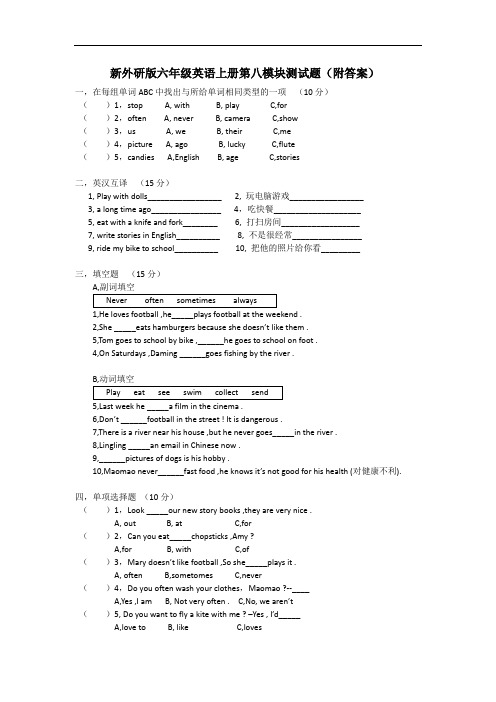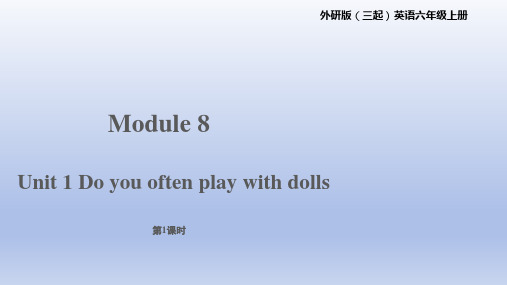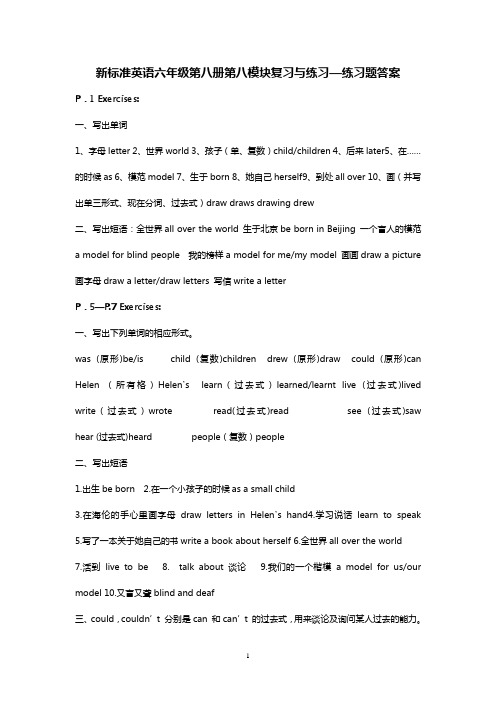六年级英语第八模块
新标准英语六年级第八册第八模块复习与练习(A)

新标准英语六年级第八册第八模块复习与练习(A)M8单词1、born/ /v.生于,出生,是动词bear的过去分词,be born in+地点/段时间:出生在(生于)哪里/什么时候.be born on+具体某一天:出生在(生于)什么时候(哪一天).I was born in Rizhao.Yang Liwei was born in Liaoning.Helen Keller was born in America in 1880.The twins were born in a small village in 1992.The girl was born on July1st,2013.注意:be born in的be经常用过去式(was,were).2、child/ /n.孩子,小孩。
复数:children/ /.一个小孩:a child.一些孩子:some children. boy-girl 3、as/ /conj.perp.在……的时候.(when,while也是“在……的时候”)as后可直接跟一个名词(短语),构成省略句,相当于when,但while一般不这样用.如:As [When] a boy, he lived in Japan. (他小时候在日本。
)=As(When) he was a child,he lived in Japan.再如:As a small child,she became blind and deaf.= As(When) she was a small child,she became blind and deaf.4、later/ / adj. & adv. 为late比较级,意指较迟,较晚一些。
如:two hours later, the ship sank. 两小时后,轮船沉没了。
See you later! 再见!另外,later 还可用作状语,表示“后来”之意。
外研版六年级英语上册第八模块测试题(附答案)

新外研版六年级英语上册第八模块测试题(附答案)一,在每组单词ABC中找出与所给单词相同类型的一项(10分)()1,stop A, with B, play C,for()2,often A, never B, camera C,show()3,us A, we B, their C,me()4,picture A, ago B, lucky C,flute()5,candies A,English B, age C,stories二,英汉互译(15分)1, Play with dolls_________________ 2, 玩电脑游戏_________________3, a long time ago________________ 4,吃快餐____________________5, eat with a knife and fork________ 6, 打扫房间__________________7, write stories in English__________ 8, 不是很经常________________9, ride my bike to school__________ 10, 把他的照片给你看_________三,填空题(15分)2,She _____eats hamburgers because she doesn’t like them .5,Tom goes to school by bike ,______he goes to school on foot .4,On Saturdays ,Daming ______goes fishing by the river .5,Last week he _____a film in the cinema .6,Don’t ______football in the street ! It is dangerous .7,There is a river near his house ,but he never goes_____in the river .8,Lingling _____an email in Chinese now .9,______pictures of dogs is his hobby .10,Maomao never______fast food ,he knows it’s not good for his health (对健康不利).四,单项选择题(10分)()1,Look _____our new story books ,they are very nice .A, out B, at C,for()2,Can you eat_____chopsticks ,Amy ?A,for B, with C,of()3,Mary doesn’t like football ,So she_____plays it .A, often B,sometomes C,never()4,Do you often wash your clothes,Maomao ?--____A,Yes ,I am B, Not very often . C,No, we aren’t()5, Do you want to fly a kite with me ? –Yes , I’d_____A,love to B, like C,loves()6,Does he want_____ a newspaper(报纸)?A, reads B, to read C,to watch()7,Look ! Daming _____a dragon kite .A, to make B,is making C,makes()8,Yesterday my cousin _____a kite ,he _____basketball .A, did fly played B, doesn’t fly plays C,didn’t flew played ()9, I stopped playing with the dolls______.A, tomorrow B, the day after tomorrow C,a long time ago ()10,The snake can use_____body to dance .A, its B, it C,it’s四,判断下列句意与图片是(T)否( F )相符(10分)( )1,The boy often eats fast food .( )2,She doesn’t like football,so she never plays football.( )3,Liwei goes to school by bus .( )4,Yesterday I watched a film .( )5,What a good boy ! He always helps his mum clean the room .五,按要求完成下列各题(10分)1,by ,never ,I ,school ,bus ,to ,go (.) (连词成句)____________________________________________2,I stopped it long ago .(同义句)I stopped it ____ _____ ______ _____3,I often clean my room .(一般疑问句)_____you often _____ ______room ?4,He likes fast food ,he always eats it .(否定句)He ____ _____fast food ,he _____eats it .5,Do you want to fly a kite with me after school ?(肯定回答)_____, ______ _____to .七,补全对话题(10分)A, Hello, this is Jim speaking , 1B, This is Tom , 2A, I am watching TV, 3B, Not often .Sometimes I play football with my friends , 4A, She often goes to a dancing class .B, 5A, You are welcome !八,阅读短文,根据短文内容判断正(T)误( F ) (10分)In China, Daming always helps his dad wash their cars on Saterdays .And he often plays computer games on Sundays .Then he does his homework and cleans his room .He sometimes plays table tennis with his dad in the park .His mum always cooks a lot of food for dinner .So they always have a big dinner at home in the evening .Simon gets up late at weekends .He sends emails to his pen friends and listens to CDs on Saturdays .He sometimes cleans the room .On Sundays his family often go to Chinatown for lunch .In the afternoon ,Simon and his dad go to the park or watch TV .()1,On Sundays Daming often helps his dad wash their cars .()2,Daming sometimes plays table tennis with his dad in the park .()3,Daming never cleans his room .()4,On Sundays Daming’s mum always cooks a lot of food for diner .()5,Simon’s family often go to Chinatown for shopping .九,写作园地(5分)选用sometimes often never always 写五个句子,要求用正确的时态,提示的词组如take photos help your mum clean your room read stories go swimming play basketball 1,___________________________________________________________________________ 2,___________________________________________________________________________ 3,___________________________________________________________________________ 4,___________________________________________________________________________ 5,___________________________________________________________________________参考答案一,1---5 B A C C C二,1,玩玩具2,play computer games 3,很久以前4,eat fast food5,用刀叉吃东西6,clean the room 7,用英语写故事8,not very often 9,,骑车上学10,show you his photos三,1,always 2,never 3, sometimes 4,often5,saw 6,play 7,swimming 8,is sending 9,Collecting 10,eats四,1---5 B B C B A 6---10 B B A C A五,1---5 T T F T T六,1, I never go to school by bus . 2,a long time ago 3,Do clean your 4,doesn’t like never 5,Yes ,I’d love七,1---5 D E B A C八,F T F T F九,1,I often take photos in the park .2,I like reading ,I always read stories in the evening .3,Do you often help your mum at the weekend ?4,I never go swimming in the river .5,Sometimes I play basketball with my friends after school .。
外研社英语六年级上册第八模块Unit1Doyou(精)

外研社英语六年级上册第八模块Unit1 Do you(精) 精读本单元主要讲解有关“食物”、“饥饿”等方面的知识点,从而帮助学生更好地了解和掌握相关英语单词和表达方式。
以下是此单元重点内容:1.进一步掌握有关食物的单词,如“apple, banana, sandwich, tea, coffee”等。
2.学习和掌握有关“口腹之欲”的表达方式,如“I’m hungry.”, “I’d like asandwich.”等。
3.通过对话练习和角色扮演的方式,进一步提高学生的口语表达能力。
泛读此单元还主要涉及到有关“时间”、“物品”的知识点,并通过学生的交流,帮助他们更加深入了解这些知识点。
以下是此单元泛读部分的主要内容:1.通过对话了解有关时间的表达方式,如“What time is it now?”, “It’sthree o’clock.”等。
2.通过交流让学生了解并记忆日常生活中常见的物品,如“book, pen,pencil, ruler, eraser”等。
听力此单元重点的听力部分主要是通过播放录音让学生听懂英语对话,并帮助他们更好地掌握听力技巧和语言表达方式。
以下是此单元听力部分的主要内容:1.让学生聆听对话,并回答相关问题,以检测他们对英语对话的听懂情况。
2.通过对话让学生学会了解并应对日常生活中的各种情境,如在餐厅点餐、询问时间等。
书写和语法此单元的书写和语法部分主要涉及到介词的使用和形容词的正确使用方法。
在学习过程中,学生需要注重以下几个方面:1.了解介词的使用和相关的语法规则,如“I’d like a sandwich withcheese.”中的“with”就是一种介词。
2.学习和应用有关形容词的正确用法,如在句子中正确使用形容词修饰名词。
3.通过练习学会正确书写各种英语单词,规范掌握英语书写方法。
在熟悉上述的知识点后,学生可以通过组织对话、阅读故事等方式来加深对所学内容的理解,进一步提高英语水平。
六年级下册英语单元测试 Module 8模块测试卷 外研社一起含答案

六年级下册英语外研版一起Module8 模块测试卷一、单词辨音。
找出下列单词中画线部分读音不同的单词,将序号写在前面括号内。
( ) 1. A. happy B. by C. butterfly D. cry( ) 2. A. mountain B. cloudy C. cough D. south( ) 3. A. mistake B. picnic C. hide D. with( ) 4. A. weather B. theatre C. bread D. head( ) 5. A. what B. where C. when D. who二、单项填空。
从A. B. C三个选项中选出可以填入空白处的最佳选项。
( ) 1. My grandma is ill. My mum cooks some soup ________ her.A. toB. forC. of( ) 2. I can’t play football well. It’s so ________.A. easyB. funC. difficult ( ) 3. —________ are you going to the park?—I don’t want to go there. I have lots of homework.A. WhatB. WhereC. When ( ) 4. —Why are you laughing?—I will tell you the ________ later.A. wordsB. thingC. story( ) 5. Lingling d oesn’t like Maths. So she makes lots of mistakes ________ it.A. atB. inC. with( ) 6. —Do you like ________ hide-and-seek?—Yes, I do.A. playingB. playC. plays ( ) 7. Ms Smart is a beautiful woman. She often ________ sunglasses.A. takesB. wearsC. has( ) 8. My friend gave me a cat. But I am afraid________ it.A. atB. forC. of( ) 9. —What did you bring here?—I ________ some cola.A. bringB. broughtC. bringing ( ) 10. —I am sorry I made a mistake in English class.—________________________A. Don’t worry!B. Yes, you did.C. Don’t do it.三、完成句子。
Module8(课件)英语六年级上册

(B ) 2. _____ you often play with _____
A. Do; doll B. Do; dolls C. Does; dolls (B ) 3. I _____ a long time ago.
A (
)
A. stoped 4. There’s
a
B. stopped picture book
Let’s learn.
Presentatio n
频度副词 always usually often
sometimes never
词义 总是 通常 经常 有时候 从不
发生频率 100% 80% 60% 30% 0
Practic
Fill in the blanks withe“never, sometimes, often, always”.
Presentation
Lingling: Do you often take photos
Amy: Yes, I love taking photos. Do you
Lingling: No. But Daming has got a good camera. He often takes photos of me. Did he show you his photos in China
Presentatio Listen and chantn.
I’m always here. I never go. You’re sometimes here. You often go.
Presentatio Read the sentencens
Simon
I always ride my bike to school. I never go by bus.
译林版英语书六年级上册第八单元课堂笔记

译林版英语书六年级上册第八单元课堂笔记一、重点单词1.taste 尝起来2.feel 感觉起来3.sound 听起来4.look 看起来5.smell 闻起来二、重点短语1.look at 看着2.sound like 听起来像3.feel like 感觉像4.taste like 尝起来像5.smell like 闻起来像三、重点句型1.What does it look like? 它看起来像什么?2.What does it sound like? 它听起来像什么?3.What does it feel like? 它感觉起来像什么?4.What does it taste like? 它尝起来像什么?5.What does it smell like? 它闻起来像什么?四、重点语法1.现在进行时的基本结构:主语+ be动词(am/is/are)+ 动词ing形式。
表示正在进行的动作或状态。
例如:I am writing a letter. 我正在写一封信。
2.现在进行时的肯定句、否定句和疑问句的变换方式与一般现在时相同,只是在be动词后加动词ing形式。
例如:I am not playing basketball. 我没有在打篮球。
Are you listening to music? 你正在听音乐吗?3.现在进行时的特殊疑问句,例如:What are you doing now? 你现在正在做什么?How are you feeling now? 你现在感觉怎么样?When are you going to finish your homework? 你打算什么时候完成你的作业?等。
新标准英语六年级第八册第八模块复习与练习—练习题答案

新标准英语六年级第八册第八模块复习与练习—练习题答案P.1 Exercises:一、写出单词1、字母letter2、世界world3、孩子(单、复数)child/children4、后来later5、在……的时候as 6、模范model 7、生于born 8、她自己herself9、到处all over 10、画(并写出单三形式、现在分词、过去式)draw draws drawing drew二、写出短语:全世界all over the world 生于北京be born in Beijing 一个盲人的模范a model for blind people 我的榜样a model for me/my model 画画draw a picture画字母draw a letter/draw letters 写信write a letterP.5—P.7 Exercises:一、写出下列单词的相应形式。
was (原形)be/is child (复数)children drew (原形)draw could (原形)canHelen (所有格)Helen’s learn(过去式)learned/learnt live (过去式)lived write(过去式)wrote read(过去式)read see (过去式)saw hear (过去式)heard people(复数)people二、写出短语1.出生be born2.在一个小孩子的时候as a small child3.在海伦的手心里画字母draw letters in Helen’s hand4.学习说话learn to speak5.写了一本关于她自己的书write a book about herself6.全世界all over the world7.活到 live to be 8. talk about 谈论 9.我们的一个楷模 a model for us/ourmodel 10.又盲又聋blind and deaf三、could,couldn’t 分别是can 和can’t 的过去式,用来谈论及询问某人过去的能力。
六年级上英语模块知识点Module8_外研社(三起)

六年级英语上册第八模块知识点一、本课单词表二、短语:1.want to 想要2.play with dolls 玩洋娃娃3.read books 读书4.picture book 图片书5. a long time ago 很久以前6.make a list 列清单7、my photo 我的照片8、go to see film 去看电影9、watch TV 看电视10、read stories 读故事11.play computer games 玩电脑游戏12、help your mum 帮助你的妈妈13、clean your room 打扫你的房间14、eat fast food 吃快餐15、visit your grandma 拜访你的奶奶16、climb trees 爬树17、go shopping 去购物18、send emails 发送电子邮件19、drink tea 喝茶20、go to the doctor 去看医生21、go to the park 去公园22、visit the moon 参观月球23、eat bananas 吃香蕉24、go swimming 去游泳三、重点句型:Do you often play with dolls?She sometimes cleans the blackboard.I often read stories to my little brother.四、语法:一般现在时:表示通常性、规律性、习惯性的状态。
在一般现在时中,当主语是第三人称单数时,谓语动词要用第三人称单数形式,即常在动词原形后加-s或-es。
一般疑问句:Do you +often + 动词短语? 回答:Yes, I do.\ No, I don’t.第三人称单数:Does he often + 动词短语?回答:Yes, he does.\ No, he doesn’t.否定句:I don’t + 动词短语. H e doesn’t + 动词短语.动词+s的变化规则1.一般情况下,直接加-s,如:cook-cooks2.以s. x. sh. ch. o结尾,加-es,如:guess-guesses, wash-washes, watch-watches, go-goes3.以“辅音字母+y”结尾,变y为i, 再加-es,如:study-studies名词变复数的规则:1.一般名词复数是在名词后面加上“s”,如map→maps,bag→bags等;2.以s,x,ch,sh等结尾的词加“es”,如bus→buses,watch→watches 等;3.以辅音字母+y结尾的词,变y为i加es,如baby→babies;4.以o 结尾的名词变复数时,只些加es:potato→potatoes tomato→tomatoeshero(英雄)----heroes negro(黑人)—negroes5.以f或fe结尾的名词变复数时,去掉f,fe 加ve如:knife→knives leaf→leaves。
- 1、下载文档前请自行甄别文档内容的完整性,平台不提供额外的编辑、内容补充、找答案等附加服务。
- 2、"仅部分预览"的文档,不可在线预览部分如存在完整性等问题,可反馈申请退款(可完整预览的文档不适用该条件!)。
- 3、如文档侵犯您的权益,请联系客服反馈,我们会尽快为您处理(人工客服工作时间:9:00-18:30)。
Module 8单元教材分析本单元教材主要学习 cup,planned,baseball, understand, mistakes 等单词。
通过学习,继续积累更多的词汇及短语,学会如何询问原因及回答。
并能用“Because…”回答别人有关原因的提问。
单元教学目标一、知识与技能1.识别单词: cup, planned,baseball understand, mistake,并能正确书写。
2 听懂功能句why do you have cups on your heads?并能口头运用。
3.能用Why are we wearing a raincoat? Because it’s going to rain. 来询问和回答有关原因的语句。
二、过程与方法1.多听录音,让学生模仿语音语调。
2.设计活动,师生互动,培养学生学习英语的兴趣。
3.从说到写反复练习,渗透单词及短语的记忆。
三、情感、态度、价值观通过本单元的学习,提高学生对语言的综合运用能力。
结合课文内容,培养学生主动解决问题的精神及学会关心别人。
单元训练重难点重点难点1.功能句What’s the matter ? / Why are you laughing?在现实生活中的正确、灵活运用。
2.运用Why...? Because ... 来询问和回答有关原因的语句。
1.从听录音中获取所需要的信息2. 灵活运用Why…? Because…课时3课时第一课时课题Unit 1 why do you have cups on yourheads?主备人授课班级六年级授课人授课时间教学目标一、知识目标1. 会听、会读、会写本课单词:laugh cup understand mistake2. 能听懂功能句why do you have cups on your heads?并能口头运用Why are you laughing?询问不理解的事情的原因。
二、能力目标1.能运用本课的功能句询问原因及回答。
2.通过学习培养学生听、说、写和灵活运用语言的能力,培养学生参与合作的意识。
三、情感目标结合课文内容,培养学生主动解决问题的精神及学会关心别人。
教学重点能口头运用Why are you laughing/crying……?询问不理解的事情的原因。
教学难点能够应用because…….回答有关原因的提问。
教学准备录音机,卡片教学环节教学内容及教师活动学生活动二次备课一、复习导入1.Greeting.2. Sing an English song.And recite the lastlesson’s chant.1.学生唱英文歌。
2.朗诵第七模块的韵诗。
二、新授1.跟录音学习本单元的新单词。
cup, more, mistake,planned,baseball,smile,with,said,raincoat。
2.让学生自己试读新单词。
3.教师领读并正音。
4.使用挂图和录音呈现课文活动1的内容。
让学生看图,理解课文意思。
带着老师提出的问题听录音,边听边思考。
5.再放一遍录音,让学生听后回答问题。
如:Who are they?What are they goingto do?Are they going tohave a baseball team?What did Linglinghear?What did Amy say?6.让学生自己朗读并翻译课文。
1.学生听录音,边朗读。
2.学生试着在课文中找出问题的答案。
3.学生做笔记,并跟读。
4.再放一遍录音,让学生听后回答问题。
三、巩固练习1.完成课本第三部分练习。
2.完成活动四。
3.检查。
让学生自己独立完成课本3,4部分内容,然后集体检查。
四、小结说说今天有什么收获?学生自由谈感想。
五、作业1.熟悉本单元单词。
2.朗读课文。
板书设计Unit1 why do you have cups on your heads?why do you have cups on your heads?Why are you ………..?Because……….教学反思第二课时课题Unit2 why are you wearing a hat? 主备人授课班级六年级授课人授课时间教学目标一、知识目标:1.识别和书写单词及短语play hide-and-seek,wearing araincoat/hat/T-shirt/dress, look at the sky,fast food .2. 口头运用Why are you wearing a raincoat? Because it’s goingto rain. 来询问和回答有关原因的语句。
二、能力目标:能运用本课的功能句询问原因及回答。
三、情感目标:激发学生学习英语的兴趣,使学生在轻松愉快的气氛中学到知识。
教学重点运用Why are you wearing a raincoat? Because it’s going to rain. 来询问和回答有关原因的语句。
教学难点灵活运用Why…? Because…教学准备卡片,录音机教学环节教学内容及教师活动学生活动二次备课一、复习导入1.Greeting2.review last class.1.把学生分成三组,分别扮演Daming ,Simon , Lingling,根据挂图表演故事。
二、新授1.听第一遍录音时,老师要求学生找出录音中提及的图片。
2.再放录音,让学生模仿录音中的语音和语调跟读。
3.学生两人一组进行操练,重点练习Why…?Because4.教师精讲whybecause 的用法,学生整理随堂笔记。
…1.再放录音,让学生模仿录音中的语音和语调跟读。
2.学生两人一组进行操练。
三、巩固练习小组合作,上讲台表演同桌讨论交流完成。
五、作业1. 把今天做过的句子在本子上做一遍。
2.自己说出第一题的录音。
板书设计Unit2 why are you wearing a hat?Why are you wearing a dress/raincoat/…..? Because I’m going to go to the theatre/…..教学反思第三课时课题Review 主备人授课班级六年级授课人授课时间教学目标一、知识目标:熟练掌握询问原因(why )及回答(because)的句子。
二、能力目标:能用所学的句型询问原因及回答。
三、情感目标:激发学生学习英语的兴趣,使学生在轻松愉快的气氛中学到知识。
教学重点如何询问原因及怎样回答。
教学难点灵活运用Why…? Because…教学准备卡片配套练习册教学环节教学内容及教师活动学生活动二次备课一、复习导入1.教师出示学生制作的卡片,重点考察短语的记忆。
学生写出相应的单词。
2.询问原因时用哪个疑问词?3.表达一个原因的句子是什么?5.教师订正错误。
1.学生默写单词。
2.学生回答老师提出的问题。
3.学生回忆写出英语句子。
二、新授1.学习唱歌曲。
(1)放录音学生认真听,第一遍,让学生跟读单词。
1.学生跟读单词。
2.学生做笔记。
(2)师讲解个别单词。
(3)学生跟着录音唱。
2.讲解重点短语。
3.生练习识记。
4.播放录音,学生听读并重复第三题,学习特殊疑问句的重音读法。
3. 听读,并跟唱。
4.学生分组唱,比赛唱。
5.学生做笔记,并识记。
6.学生听读并重复学习特殊疑问句的重音读法。
三、巩固练习1.完成第5题中的对话,两人一组交流。
2.根据课文提示完成第6小题。
1.摘抄第4题中的重点句子。
2.两人一组操练对话。
四、小结今天我们学习了Why…? Because…,同学们要在对话练习中灵活运用。
给同桌说说你做的最好的几个句子。
五、作业抄写第4题中的句子。
板书设计Why did the girl go into space? Why did the boy eat fast?Why did the dog sit under the tree?教学反思。
